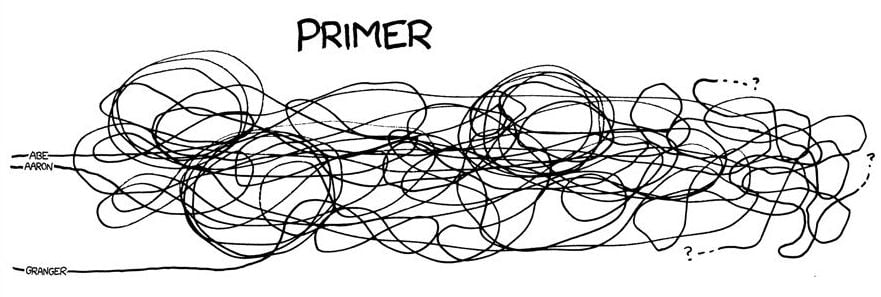Some ideas are:
- You branch off into another timeline and your actions make no difference to the previous timeline
- You’ve already taken said actions but just didn’t know about it so nothing changes
- Actions taken can have an effect (so you could suddenly erase yourself if you killed your parents)
- Only “nexus” or fixed events really matter, the timeline will sort itself out for minor changes
- something else entirely
You’ve already taken said actions but just didn’t know about it so nothing changes
12 Monkeys did this one perfectly.
You can’t change things because if you undid the thing, then there wouldn’t be a reason to undo the thing. If you go back in time, you are just going to do what you already did because that is in the past.
I’d totally forgotten about 12 monkeys. I had that VHS of this when I was 11 or 12 years old, I probably watched it 30 times and I never fully understood it. 25 years later I think it’s time for me to rewatch this
Rewatched it recently, it held up really well!
Logically speaking it’s the only way time travel can be done, and for bonus points physics wouldn’t have a problem with it.
Any Back to the Future shenanigans is just creating alternate realities, which may or may not instantly destroy the original.
If you go back in time, you are just going to do what you already did because that is in the past.
Only if the Universe is deterministic. If not, random rolls having different outcomes may completely change the course of events and decisions made by people.
Edit: I see I’m being downvoted, so I’ll explain further, if the Universe is deterministic means everything will be the same any time you relive the same time segment, if not, it means even the weather can be different due to aggregation of butterfly effect of different random outcomes in the Universe, and weather being different is already big enough change to be able to influence decisions and course of events. And I’m not meaning weather in the exact same spot you time-traveled to. Even if you restored the exact same state of Universe at some snapshot, if the Universe isn’t deterministic, various random events happening after that point in time can have different outcomes which will aggregate and lead to even more different outcomes in future. Weather might be different the next day and because of that you decided to hide from rain in cafe and met someone there which can completely change your life.
Maybe this is the same as what you’re saying but my issue with the idea that “You’ve already taken said actions but just didn’t know about it so nothing changes” is that it means time travelers don’t have any free will once they go back in time. If that’s the case, then it bring up existential concerns and that might extend to non backwards time travelers (i.e. us)
I think from a physics standpoint, strict free will is already an illusion and the only useful definitions of free will basically boil down to “choices can be made”, perhaps as far as “Slight differences in initial conditions can lead to different choices” (but somehow excluding random processes). That kind of definition doesn’t even require consciousness, and is compatible with a deterministic universe like ours seems mostly to be. Would also be compatible with the time traveler unwittingly doing everything as must happen, but still via individual choices.
Choice is one of the slight differences that can lead to different outcomes. A rock falling down a hill will always fall downhill because of gravity. An animal can choose to slow itself or even work against gravity to move uphill. Instead of gravity, there are a ton of prior experiences that will influence that choice, but choice is still a distinct part of the process.
Exactly. That’s why I think the only useful definitions of free will are those that are weak enough to distinguish between the animal and the rock in a situation like that.
Are you saying that even without time travel, free will is an illusion? Surely there has to be a time travel scenario, like going back 1 second in time and shaking hands, where all information is known to both travelers, and the future self would know what was done previously, and can choose to take a different action.
I can think of a couple ways around that, the easiest is that I actually think time travel is impossible. (Like this for example)
If it’s not impossible, then single-timeline travel probably is, and all (backwards) travel would start a new timeline.
Short of that, maybe something ridiculous would have happened when the traveler “first” went back, like one of them tripping or whatever, and the handshake they agreed to try didn’t go as planned, and then “still” didn’t the traveler’s second time. Basically this.
Let’s suppose a time travel event occurs in which an agent with free will travels to their own causal past, and let’s suppose this creates a parallel timeline which can differ from the first (leading to a new version of the agent which creates a third timeline, and so on).
We can consider this time-travel event as a function in which one timeline maps to a successor timeline — or in general, the event is an iterative map from the space of possible timelines to itself. If this map meets a few general criteria, we can apply the fixed point theorem and conclude that, after enough iterations, the process will converge to some fixed point that maps to itself (that is, the agent causes the past of their own timeline, even though they have free will). This timeline maps to itself—but it is also mapped to by an infinite succession of timelines in which the agent is free to alter their successor timeline, converging on one in which their choices cause no further alteration.
At that point, we can dispense with the assumption that time travel creates parallel timelines, and assume instead that the fixed-point, self-causing timeline is the only real one.
You’re assuming that time travel is equivalent to “rewinding” the intervening time span as if it had never occurred—in which case, yes, nondeterministic events are likely to happen differently.
But that’s not the case if time travel is a closed time-like loop (which is implicit in the “immutable-past” of OP’s second scenario). In that case everything happens only once, so it makes no difference whether or not the universe is strictly deterministic.
Nothing is truly random, including the weather. It is extremely complex and difficult to predict, but once it happens that is what happened. As long as dice fall with the exact same speed and hit the same surface in the same spot at the same angle it will always end up with the same result. The randomness of dice comes from how the very small differences influence the outcome.
Going back in time with the knowledge of what happened the first time means that either you will choose the same thing because something led to that original choice or something will keep you from interfering. Free will exists because we don’t literally know the exact outcome of our actions or the things outside of our control in advance.
Nothing is truly random
Modern physics says otherwise. Einstein also thought exactly like that with his “hidden variables” theory which was later disproven.
Edit: I was interested to read some relevant discussions and here’s some links with quotes
https://philosophy.stackexchange.com/questions/29364/does-true-randomness-actually-exist
It seems very likely that every deviation from perfect homogeneity and isotropy in the universe is due to amplified quantum fluctuations. (That’s true in inflationary cosmology, and I’d expect it to be true in practically any alternative to it.) For example, the shape of Earth’s land masses was probably determined by quantum fluctuations, and has had an enormous influence on human history.
Quantum fluctuations is basically true randomness on quantum level.
The randomness is largely canceled out, except in the case of unstable systems which magnify the effects of any perturbations, no matter how small.
Oh, I’ll have to watch that
“Default behaviors is undo, no redo. You control undo the undo. Emacs.”
I recommend undotree, which is also a non-destructive undo, but for some cases makes it easier to reach those points.
I like the one where the motion of the universe is not accounted for, so the travelers drop into empty space. But someone figures out how to use that to travel through space.
Time Wars are fun though. Each prime timeline moving others toward them.
Be a potentially energy-efficient way to exit a gravity well in a spacecraft if you could exploit that and it doesn’t require too much energy. Instead of launching a spacecraft, just send it back in time to when a point was no longer in that well.
EDIT: if the above conditions hold (it’s possible and requires less energy than launch), you also have an infinite-energy-production machine, because you can obtain more potential energy than you are expending energy to time-travel.
If you screw up the calculation, your time machine can also end up deep under the mantle of the Earth. That would be a pretty spicy way to travel.
Whichever one is objectively correct based on empirical evidence.
Fun fact: time travel does exist, and I am myself a time traveler. The fact that I’m travelling at one second per second along with everyone else is just a minor detail.
Imagine if someone just naturally traveled through time at like… 1.0005 seconds per second… What would that look like? Would we be able to tell? Would they be able to tell? Would their perception be different?
This is a Relativity thing, isn’t it? Like the astronaut twins sort of…
That’s exactly like being a bit closer to the bottom of a steep gravity well.
Yes, we could tell if they took a precise clock with them. In fact, we have to account for an even smaller discrepancy in order for GPS to work: we here stuck further down in Earth’s gravity well travel through time and extra ten milliseconds or so per year vs. an orbiting satellite.
Are we traveling through time? Or is time simply a universal constant of entropy? Everything you experience is energy flowing from a higher potential to a lower potential, with some “loss” to heat. Without that downward shuffle, a rock balanced on it’s tip is indistinguishable from a time-stopped version of itself.
Basically, time is your body’s sensation of the inevitable terror that is the heatdeath of the universe.
Why would it be less terrifying to be further away from a gravity well?
I think you meant this comment for a different thread.
Nope.
Okay. What did I say about gravity wells?
You implied that life would be more terrifying the faster you traveled through time, like what would happen at the bottom of a gravity well.
Where?
I have always been a fan of stable time loops so I guess option 2 is the best one for me.
One trope I’d like to see more of is loops which are not stable themselves, but are stable as a group. Eg a 2-loop has loop A in which someone goes back in time and changes history leading to a new timeline loop B. Someone in loop B later goes back in time and changes history in a way that turns the timeline back into loop A.
My headcanon is that your option 3 is basically an n-loop that we only see the first few loops of.
You may like the show Dark, if you haven’t already seen it.
Dark
The season 3 story was pretty much why I’m interested in this trope! Although I maintain Dark was not a stable time loop story, it just had the appearance of one.
I really like the nothing is changeable and travel is possible and anything you do while traveling has already happened / was already going to happen concept
I wouldn’t say I “like” the idea, since it’s one of the most doomed ways for a universe to be, but Greg Egan’s Arrows of Time is a good exploration of this idea.
Its a one way trip. You can never go back to the original universe.
Holy existential horror, Batman! By time traveling, you’ve just caused an entire universe full of new alternate-timeline versions of people to pop into existence. What happened to the timeline you left? It must still exist. You couldn’t have been the only consciousness that was experiencing it. To think otherwise is some extreme solipsism. Gosh, did some other time traveler create the timeline you left by entering it? For that matter, are you actually a duplicate, having just popped into existence with the memory of having time-traveled, but the timeline was created by another time traveler?
Alternatively, perhaps it’s another timeline out of an infinite number of possibilities that all co-exist? Yikes! That means there’s an infinity of each person across the multiverse. Therefore, you could just murder everybody within reach, and time travel back before your started the rampage. The lives in a particular timeline don’t matter, there are an infinity more. I think Rick & Morty did an episode with that premise.
What happened to the timeline you left? It must still exist. You couldn’t have been the only consciousness that was experiencing it. To think otherwise is some extreme solipsism.
Why does it need to remain? It seems like solipsism to assume it must remain because it’s your point of origin. If something or someone has the power to drop something into the past why wouldnt it overwrite everything? I don’t see why consciousness even gets applied. The universe keeps on whether I am alive, asleep, or dead.
I see the path of time like a laser beam in a house of mirrors. If someone has the power to add a mirror somewhere. Yep, the whole beam after the fact is a vastly different pattern. Any multiverse would be entirely virtual and theoretical.
Why does it need to remain? Because that timeline was populated by 8 billion human, and who knows how many non-human minds. I think it would be solipsism to think that only your own mind was the “real” one keeping the timeline in existence, and it collapsed because you leave it.
If the time travel power does overwrite everything, all of those minds and all of their subjective experiences are just, nothing? That’s where the existential horror comes in for me.
Oh I agree, it’s horrifying. And I have noooo guarantee that it’s me doing the jump. Don’t misunderstand I am NOT the only real mind in this example. I’m curently just hitching a ride on said laser beam. No guarantees that I will be the same or even exist if somebody so much as moves a pebble into the past from the future.
Existential dread all the way. If we get time travel I think it’s as horrifying a prospect as teleportation on a universal scale with only the traveller maintaining continuity.
This is my biggest issue with multiverse time travel in popular culture. Somehow they always travel back and forth between 2 of Infinite timelines
If it actually existed, then obviously I would subscribe to whatever theory most accurately described how it worked. That’s science.
If you’re asking which theory I would predict is most likely, knowing only that time travel was possible as a starting point, then there are only two that I’m aware of that are logically consistent. Either:
-
Single fixed timeline, whereby if you go back in time then whatever you do there was already a part of history from the start. You won’t be able to “change” anything because you were always there. This is the approach described by the Novikov self-consistency principle.
-
Multiple worlds, in which if you go back in time you just end up following a different “branch” of history forward from there.
Any of the models that let you “change your own history” are logically inconsistent and therefore utterly impossible. They just can’t exist, like a square triangle or 1=2. They may be fine for entertaining movie plots but don’t take them seriously.
I just imagine if life is a simulation and everytime someone travel back a new branch created but then coming back to present timeline you have to fix all the merge conflicts.
But what if: https://en.wikipedia.org/wiki/Square_triangular_number
Slightly more seriously (but only slightly), what if what we see as Heisenberg uncertainty and probabilistic wave/particle weirdness is actually the result of multiple overlaid timelines caused explicitly by time travel, and if time travel wasn’t possible, the universe wouldn’t have those properties?
-
I like the persistent present. We simply live with the paradoxes.
“Remember when Hitler was assassinated in 1919, 1933, 1936, and 1939, then off’d himself in his bunker in '45?”
“An unidentified man in SS uniform reportedly tried to kill Hitler during a rally at the Berlin Sportpalast.” 1939
This was definitely the time traveller.
LOL. I knew there were a lot, never looked it up! The problem is, in the time travelling paradigm, those would fit in the self-mending timeline end of the theory. This version would simply have many dead hitler. Like schroedinger’s cat or photons or whatever.
From a quantum perspective the Deutschian and similar models are honestly pretty compelling. They essentially require matching up the past and present in a consistent way that can remove paradoxes.
These make the most sense because it’s entirely possible to write down spacetimes that contain “closed time like curves” (CTCs) ie. paths connecting past and present and you can then just let physics play out on these models (or more commonly using black box quantum circuits). The only consistent way to do it is to make sure the past and future side of such curves agree. It’s not my area at all, just something colleagues of mine did, but from memory there are nice approaches using the path integral formalism that work really nicely in these scenarios.
All that’s to say that I don’t think time travel leads to anything changing, the past will have always agreed with whatever time travel happens in the future.
Having worked very briefly with the spacetimes that produce CTCs, I don’t expect we’ll be able to time travel because they usually violate the weak energy condition.
https://en.m.wikipedia.org/wiki/Quantum_mechanics_of_time_travel
Primer because Primer. (Video warning and some spoilers for a bunch of different films.)
I don’t know if I would subscribe to it, but it is one of the more interesting ideas for time travel.
Primer spoilers, kinda, xkcd style:

- You branch off into another timeline and your actions make no difference to the previous timeline
New actions, new consequences.
This. Time traveling is a purely selfish endeavour.
Go back and kill Hitler? Congratulations! Only you understand what changed. Doesn’t help the 7 billion people you left in your original timeline.
But you now get to live in a cool alternate reality where the soviet union clashed directly with the allied forces as the axis never existed.
. . .
Kirov reporting.
I believe it’s impossible in the real universe.
Sure there are solutions of general relativity that contain time loops, but they require stuff like an infinitely long cylinder, or escaping a spinning black hole, or negative energy. I just don’t believe beings made of finite matter and with finite energy will ever be able to time travel (except into the future at various rates) and that’s the only kind of beings I think exist.
But my question was if it was possible. Not do you believe it’s possible.
You’re right.
It would have to be multiple timelines or single consistent history. Of the two, I think multiple timelines is a little more likely.
The only saving grace of GR based time travel is that we don’t actually know if the weak energy condition is physical. It probably is, but technically it could be a false assumption.
Yeah, but I feel like if it were feasible to violate the condition we would have done it by now (besides the Casimir effect). That’s just an opinion of course, and I’m just an interested layperson, but I know physicists have been trying for at least a few decades.
You are currently correct. Things change.
The past, present, and future do not exist as separate states.
Imagine a vast array of all possible states of matter in the universe. Imagine reality has a finite spacial resolution. With a series of numbers, or even a single very large number, you could provide a unique identifier for every possible arrangement of matter in the universe. The positions of every star and galaxy. The detailed interactions of every quark. Imagine a list or array that would have a number of entries equal to some indecent multiple of “ten to the ten to the ten…” Imagine all these possible states, every possible configuration the matter of the universe could occupy.
Then realize…All of these possible states exist at once. They are all as real as any other. There is no preferred state. They all exist in some vast “10 to the ten to the ten” dimensional spacetime. What we perceive as the flow of time is simply us moving from one of these states to another. But our consciousness cannot move arbitrarily between states. There are elaborate rules on which states you will be able to observe dependent upon the states you previously observed. We call these rules the laws of physics.
So when you travel through time, you are simply altering your path on this vast multiverse of possible realities. There is no “real” reality. They are all real. Every possible configuration of the matter and energies of the universe physically exist concurrently.
There are no timelines to split or erase, because there are no timelines. There are just conscious minds moving through a near-infinite array of possible “nows.” And all of the nows exist simultaneously. There is no real one. From the perspective of a “time traveler,” it will seem like they changed “the future.” But the truth is the very idea of a past, present, and future as distinct entities is madness. We’re just consciousness drifting through the continuum, from one of the near-infinite nows to another.
That’s a really long way to say “the first one”.
I think it’s the 2nd option
It’s just the first one, only specifically a version where all timelines exist and you simply navigate them. I can see how it might feel like the second one because the timelines already exist, but from one’s subjective viewpoint it’s #1.
I think the first one leaves open what you do, as alternate actions lead to an alternate timeline. The second is more “read-only”, similar to what OP laid out.
The only difference between the first option and the response is that the response posits that all possible timelines exist in advance and rather than generating a new timeline with your decisions, you simply navigate to the one that represents them. It’s a distinction without meaning, especially because the first option doesn’t strictly specify whether the timelines existed in advance or not. It simply says “you branch off into another timeline” with no requirement that it be one generated as a result of your actions.
The second option is called “closed loop” or Novikov self-consistency and specifically requires that the outcomes of your choices align with the past already as defined, simply in ways you did not know. It’s what they use in 12 Monkeys and the 3rd Harry Potter book, and it limits free choice, unlike the first option and what the above poster’s response stated.
I think what you’re doing is combining closed-loop and multiverse theories to say that the multiverse theory IS closed-loop simply because the multiverses existed in advance, whereas closed-loop is intrinsically single universe/timeline.
I appreciate those detailed insights, I see where I misunderstood. I need to reread the 3rd HP novel with my son now :)
It’s my favorite of the series, though I hate what JK Rowling turned into. Hope you and your son enjoy!
Hmm don’t really agree, as you can observe different parts of space on different time periods due to light’s finite speed and time dilation and such. Not all parts of space are at the same time simultaneously. Also, relativity tells us that the state you observe is different from the state of another observer. So you can’t really write this number of the universe down (or at least, you can only write your own personal number down but it won’t be the same as anyone else’s number).
The one where you can only jump forward, not backward. It avoids the common paradoxes.
we already live in that one
See? Problem solved.
I don’t need anymore subscriptions, thank you.
















